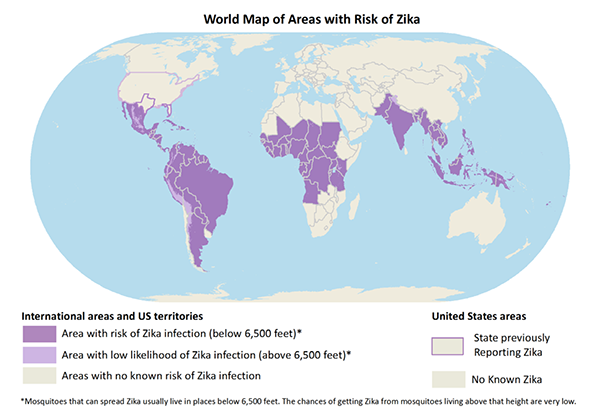The Problem
Mosquitoes transmit numerous human diseases with serious global health impacts, including malaria, dengue fever, and the zika virus. Our first graduate student cohort concentrated on the mosquito, Aedes aegypti, which transmits dengue to over 100 million  people each year and heavily burdens the health care systems of developing countries. Also a vector for zika, chikungunya, and yellow fever, this mosquito is seldom completely kept in check by traditional control methods. As the symptoms of these viruses range from minor flu-like to severe hemorrhaging, circulatory shock and sometimes death, innovative solutions are sorely needed. The zika epidemic has led to thousands of babies born with microcephaly and other severe birth defects and is effecting over 80 countries.
people each year and heavily burdens the health care systems of developing countries. Also a vector for zika, chikungunya, and yellow fever, this mosquito is seldom completely kept in check by traditional control methods. As the symptoms of these viruses range from minor flu-like to severe hemorrhaging, circulatory shock and sometimes death, innovative solutions are sorely needed. The zika epidemic has led to thousands of babies born with microcephaly and other severe birth defects and is effecting over 80 countries.
Genetically engineering mosquitoes to carry anti-pathogen or lethal genes is an innovative form of vector control that can work in combination with current tools such as insecticides and larval habitat removal to reduce mosquito populations. Our 2012 Cohort examined the technological, social, economic, and humanitarian questions and challenges facing researchers and policy makers exploring the use of transgenics to aid in mosquito suppression and disease trasmission control.
The People
Graduate Student Fellows & Associates
- Timothy Antonelli, Biomathematics
- Molly Hartzog, Communication, Rhetoric and Digital Media
- Arina Loghin, Anthropology (Associate)
- Sophia Webster, Entomology
- Amanda (Clayton) Walsh, Economics
- Gabriel Zilnik, Entomology
Faculty Mentors
- Andrew Binder, Communication
- Matthew Booker, History
- Zack Brown, Agricultural & Resource Economics
- Yasmin Cardoza, Entomology & Plant Pathology
- Jason Delborne, Forestry & Environmental Resources
- Fred Gould, Entomology & Plant Pathology
- Nick Haddad, Biological Sciences
- Nora Haenn, Anthropology & Sociology
- William Kimler, History
- William Kinsella, Communication
- Jennifer Kuzma, Public Administration
- Alun Lloyd, Biomathematics
- Marce Lorenzen, Entomology & Plant Pathology
- Max Scott, Entomology & Plant Pathology
- Wally Thurman, Agricultural & Resource Economics
The Project
The 2012 Student Cohort began their investigation of this issue with a 
trip to Lima and Iquitos, Peru, to gain a better understanding of the real-world issues facing people and researchers battling these diseases. Through our partnership with Tom Scott and Amy Morrison of U.C. Davis, our students gained first hand experience in dengue epidemiology and Aedes aegypti ecology at the Amazonian field site in Iquitos, Peru.
The global problem of dengue fever is a multi-faceted, complex issue that spans many different disciplines. Influenced by their time in Peru and implementing an integrative interdisciplinary approach, the 2012 Cohort produced a white paper that provides a comprehensive overview of current technologies used to control dengue fever and addresses the controversial question of whether transgenic technologies should also be used. Their co-authored white paper, “Transgenic Pests and Human Health: A Short Overview of Social, Cultural, and Scientific Considerations”, was selected for publication as the opening chapter in a book edited by Dr. Zach Adelman, entitled Genetic Control of Malaria and Dengue. A comprehensive collection of insights from researchers in genetics, microbiology, virology, ecology, ethics, and communication, Adelman’s publication provides a practical guide to the pros and cons of genetic engineering as a means of pest management.

